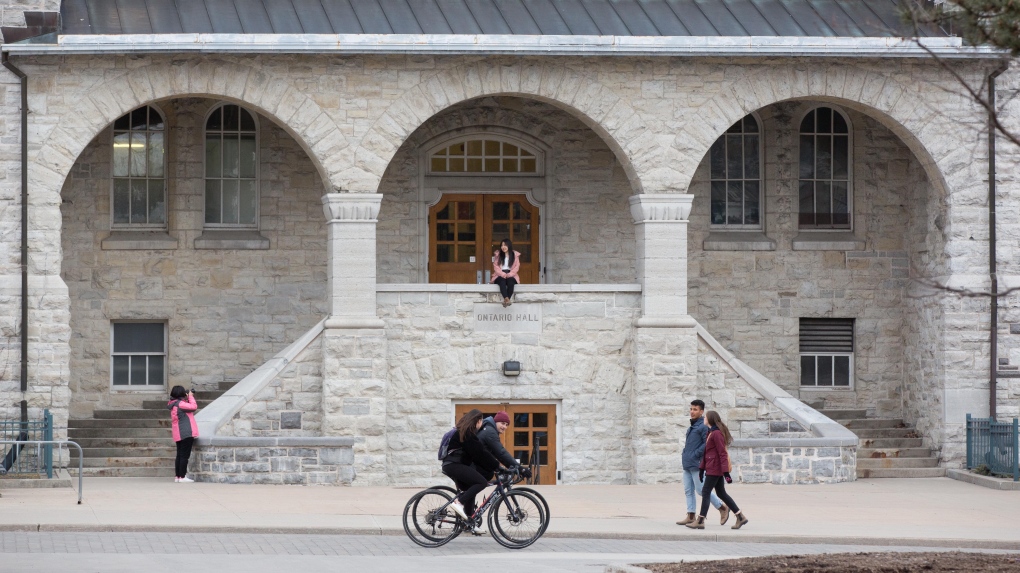Cap on student visas could wreak financial havoc on Ontario universities, says rep
 Ontario hall at Queen's University campus in Kingston, Ontario, on Wednesday March 18, 2020. THE CANADIAN PRESS/Lars Hagberg
Ontario hall at Queen's University campus in Kingston, Ontario, on Wednesday March 18, 2020. THE CANADIAN PRESS/Lars Hagberg
The Council of Ontario Universities says the newly announced cap on international student admissions is unfairly punishing responsible institutions alongside bad actors in the post-secondary sector.
Steve Orsini, president and CEO of the organization, is calling on the federal government to reverse its decision to cap the number of new study permits it issues over the next two years.
He says many universities are already in perilous financial situations and capping international student enrolment will add more strain on their budgets.
"We think a more refined, targeted approach would be better policy and not impact the good performers that rely on that funding or revenue from international students to operate," Orsini said in an interview.
- Download our app to get local alerts on your device
- Get the latest local updates right to your inbox
Immigration Minister Marc Miller announced new limits to the international student program Monday, including a 35-per-cent reduction in the number of study permits it issues this year.
The cap comes in response to a recent surge in international students and concerns that some institutions are relying on international enrolments to boost revenues, without offering necessary housing or a quality education.
According to the council, at least 10 Ontario universities were already forecasting a combined operating deficit of $175 million this year, growing to $273 million next year.
The newly announced cap would likely increase these deficits without other measures to compensate for the revenue shortfall.
Orsini said the federal government should take a more careful approach and go after institutions that are not taking in international students responsibly.
"The federal government needs to go back to the drawing board to better target their measures to go after the (institutions) that they should be going after," Orsini said.
"Ones that have exponential growth in students, that don't provide supports, the wraparound services or housing."
Part of the challenge facing Ontario post-secondary institutions is the provincial government's freeze on tuition fees.
It has forced institutions to increase their dependence on tuition fees from international student tuition, which are considerably higher than those for Canadian students.
Ontario's Progressive Conservative government introduced a 10-per-cent tuition cut in 2019 as it cancelled the former Liberal government's free tuition program for low- and middle-income students. It has frozen fees at that level since then.
A government-commissioned report released in November said Ontario should end its post-secondary tuition freeze and increase per-student funding to its universities and colleges.
The report, which was put together by an external expert panel, said ending the tuition freeze and boosting per-student funding would greatly help post-secondary institutions.
Orsini said he would like to see the provincial government implement the panel's recommendations.
"We're at a critical juncture. We're asking the province to implement those recommendations urgently."
This report by The Canadian Press was first published Jan. 23, 2024.
CTVNews.ca Top Stories

PM Trudeau 'surprised' provinces unanimous on accelerated defence spending: Ford
Ontario Premier Doug Ford says his fellow provincial leaders are united in pushing for Canada to meet its NATO defence spending targets ahead of schedule, and that Prime Minister Justin Trudeau was "surprised" to hear it.
One man dead after shooting in Kitchener tiny home community
One man is dead after an afternoon shooting at 49 Ardelt Ave. in Kitchener.
Heavy snow and numbing temperatures keep parts of the U.S. in a deep freeze
Heavy snowfall and numbing temperatures kept parts of the U.S. in a deep freeze Sunday as the Thanksgiving holiday weekend draws to a close.
Immigrants take to the streets to protest against the freezing of immigration programmes
In response to the freeze on immigration programmes announced by Ottawa, an organization that defends the rights of immigrants is organising a demonstration in front of the Montreal office of the Quebec Ministry of Immigration, Francisation and Integration early on Saturday afternoon.
A Japanese artist finds solace and global fans with intricate leaf-cutting
A frog holding a taro-leaf umbrella. An Ukiyo-e style Mount Fuji. Giant waves. Japanese artist Lito carves these delicate designs on fallen leaves.
Shopping on Shein and Temu for holiday gifts? You're not the only one.
Welcome to the new online world of impulse buying, a place of guilty pleasures where the selection is vast, every day is Cyber Monday, and an instant dopamine hit that will have faded by the time your package arrives is always just a click away.
'Disappointing': Toronto speed camera cut down less than 24 hours after being reinstalled
A Toronto speed camera notorious for issuing tens of thousands of tickets to drivers has been cut down again less than 24 hours after it was reinstalled.
Beef prices reach record highs in Canada
The cost of beef continues to rise, reaching record highs on grocery store shelves ahead of the busiest time for many grocers and butchers before the holiday season.
A man hid 5 treasure chests worth more than US$2 million across the United States. Here’s how to find them
Inside the chests, searchers can look forward to hopefully locating items such as rare Pokémon cards, shipwreck bounty, sports memorabilia, gold and precious medals.

































